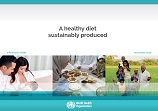Sustainable Food Systems
A healthy diet sustainably produced - WHO Information sheet

A safe and healthy diet contributes to an optimal state of health and protects against all forms of malnutrition. It also reduces the risk of noncommunicable diseases (NCDs) and promotes a strong immune system that protects against infection. Every human being has a fundamental human right to adequate food and nutrition. However, unhealthy diet is one of the top risk factors for the global burden of disease and, together with maternal and child malnutrition, accounts for about one quarter of global deaths.
Meanwhile, today’s food systems struggle to provide everyone with the safe and sustainably produced food needed to ensure healthy diets. Ensuring a healthy diet now and into the future, therefore, demands that we focus on the most vulnerable populations, on promoting a healthy and diverse diet and on changing to sustainable food production systems.
This information sheet shows that a healthy diet which is sustainably produced and consumed is a “win-win” for people’s health and planetary health. In addition, the information sheet is developed using an equity/gender lens.
Key facts and recommendations for healthy eating are summarized and a useful list of concrete actions are proposed for governments to promote healthy and sustainable diets. Links to WHO fact sheets on related topics are provided.
A healthy diet sustainably produced - WHO Information sheet





